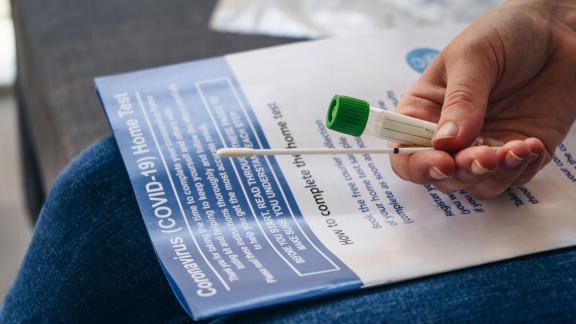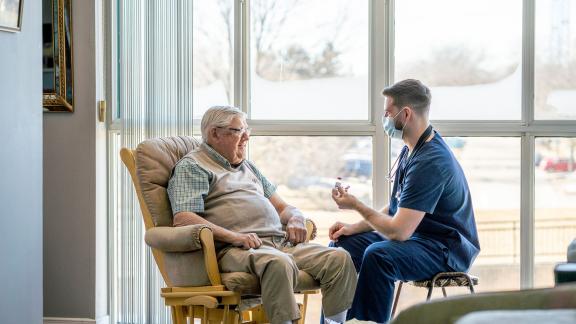Guidance to Support Individuals with Long COVID-19 to Return to Work & Guidance to Support Individuals who are asymptomatic but test positive
31 October 2023

-
Part 1 - Supporting the Individual
Following agreement at the Welsh Partnership Forum Business Committee on 8 June 2023, the arrangements for the transition from enhanced provisions to application of regular sickness absence were withdrawn with effect from 1 July 2023. However, there are some key elements that Business Committee members from employers, trade unions and government alike felt needed to be maintained, refocussed, and again promoted within the NHS in Wales. This element is the bespoke support that line managers need to provide to individuals with Long COVID-19 to facilitate their return to the workplace.
To assist staff to return to the workplace following a lengthy period of COVID-19 related sickness absence, a programme of specific support needs to be put in place.
This includes: -
- the development of bespoke phased return plans which may enhance the provisions currently outlined in the MAAW policy, e.g., multiple phased returns on full pay if an individual needs to combine their return with several episodes of sickness absence as part of their managing and sustaining their return to work. Phased returns on full pay are a key tool in supporting an individual in returning to work and can be a key part of the recovery process.
- highlighting with managers the importance of regular communication with the individual and arrangements for them to visit the workplace to keep in touch with colleagues.
- increased access to health and wellbeing/occupational health services for the individual.
- arranging refresher skills courses.
- holding career conversations.
To support this approach, guidance for managers to support individuals on a long-term absence with COVID-19, including a detailed section on phased returns, has been previously developed in partnership and so managers are encouraged to take some time to consider the guidance and think about how they can use it to support individuals to return: -
In addition: -
- managers whose members of staff develop Long COVID-19 and where their absence extends beyond their contractual entitlement to full pay, are reminded of the existing provisions within the national Terms and Conditions of Service and the need to consider, on a case by case basis following discussions between manager and member of staff, whether it is appropriate to provide ongoing enhanced sick pay support above half pay or no pay.
- some individuals, currently on prolonged sickness absence, may have had an operation or other treatment cancelled which would have supported a return to work. Such individuals, as a result of the cancellation may move into a half pay or no pay situation. If the delay to treatment is as a direct result of the COVID-19 pandemic, then the existing provisions, allowing the flexibility to maintain full or half pay, set out in Section 14.13 of the Terms and Conditions of Service Handbook: Sickness Absence and paragraphs 225-244 of the Medical and Dental Terms and Conditions of Service (Wales) will apply. Managers must actively consider using this discretion and it is important that arrangements are put in place to consider the use of this provision through the consideration of an individual’s circumstances on a case-by-case basis rather than through the operation of a blanket organisational approach.
- the provisions for Injury Allowance are in place for organisations to consider based on the circumstances of each individual case. It is noted that the decision-making process for approval of any applications is on the basis of the “balance of probability” and it would be expected that organisations look carefully at each application with this in mind. This additional pay support is permitted within existing provisions contained within the NHS terms and conditions of service handbook and the Medical & Dental handbook.
Assessing the Risks
Line managers are asked to consider every option open to them, to explore the flexibilities, and to consider the guidance and to do their utmost to support individuals with Long COVID-19 to return to the workplace wherever possible. As part of supporting individuals with Long COVID-19 to return to the workplace, line managers in consultation with the individual will need to undertake a risk assessment bearing in mind the individual’s condition and the setting in which they are employed.
Likewise, line managers will need to undertake similar risk assessments when considering whether an individual with respiratory illness symptoms is safe to attend the workplace or whether they should be asked not to attend from an Infection Prevention and Control (IPC) and an Occupational Health and Safety (H&S) perspective, particularly bearing in mind other vulnerable colleagues who may be placed at risk by that individual returning to the workplace prematurely. Individuals who have been asked not to attend for an IPC and/or H&S reason must receive full pay.
Discussions will need to be held at local level and involve IPC and H&S colleagues and bear in mind the latest Welsh Government guidance on the link below: -
Advice for health and care staff on respiratory viruses including COVID-19: guidance | GOV.WALES
Organisations should have risk assessment processes in place that have been agreed in partnership. Additionally, a link is provided below to the Health and Safety Executive guidance which organisations may want to reference in any internal communications within their organisation: -
https://www.hse.gov.uk/simple-health-safety/risk/index.htm
[1] To be read in conjunction with the All Wales Managing Attendance at Work Policy
-
Part 2 -
Question 1:
Is the individual who has tested positive for COVID-19 well enough to attend work?
No – Normal sickness absence (MAAW policy) procedures apply.
Yes – see question 2.
Question 2:
Does the individual pose a risk to colleagues or patients if they were to carry out their normal duties or do they have any specific circumstances that need to be considered (vulnerabilities and risks such a pregnancy and disability will need to be fully considered)?
No – work as normal.
Yes – see question 3.
Question 3:
Can the individual be moved to other duties/work from home thus eliminating the risk?
Yes – facilitate the alternative duties / WFH. The colleague should be paid what they would have been paid had they been in work.
No – medically exclude in line with the Managing Attendance at Work policy. The colleague should be paid what they would have been paid had they been in work. There should be no prompts as a result of the absence.
Question 4:
How long should a colleague be medically excluded for?
They should be medically excluded for 5 days from the date they took the test.
NB – if initially an individual is too ill to work but becomes fit to work but is still testing positive for COVID-19 then assessment of risk against the above questions should be used to determine the correct course of action.



